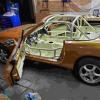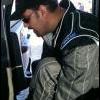Hi all, I'm in the middle of a new build and was wondering from those with experience if deleting ABS is worth the hassle, or if I should just pull the fuse and be done with it? My understanding is the booster, master cylinder, and lines all need to be replaced. I've got the motor out, so now's the time if I'm going to bother.

ABS Delete worth the expense/effort?
#1

 Posted 03-17-2020 11:11 AM
Posted 03-17-2020 11:11 AM

#2

 Posted 03-17-2020 12:20 PM
Posted 03-17-2020 12:20 PM

Hi all, I'm in the middle of a new build and was wondering from those with experience if deleting ABS is worth the hassle, or if I should just pull the fuse and be done with it? My understanding is the booster, master cylinder, and lines all need to be replaced. I've got the motor out, so now's the time if I'm going to bother.
You should make weight, if so.. dont bother IMO
Jim
East Street Auto Parts
Jim@Eaststreet.com
800 700 9080













#3

 Posted 03-17-2020 08:09 PM
Posted 03-17-2020 08:09 PM

I have no knowledge of how that system is plumbed but is there no downside to leaving it all in place but not operative?
- Jim Drago likes this


#4

 Posted 03-17-2020 09:35 PM
Posted 03-17-2020 09:35 PM

You have to replumb all the lines if you remove the block I think, so it's an all or nothing proposition.
#5

 Posted 03-17-2020 09:47 PM
Posted 03-17-2020 09:47 PM

You have to replumb all the lines if you remove the block I think, so it's an all or nothing proposition.
Yep, I get that, just saying the block would bug me until I did it.
Still wondering if leaving all that in place has any impact on brake feel etc.


#6

 Posted 03-18-2020 12:09 PM
Posted 03-18-2020 12:09 PM

Yep, I get that, just saying the block would bug me until I did it.
Still wondering if leaving all that in place has any impact on brake feel etc.
I wouldn't expect a pressure drop (to your point about feel) but would you want to flush that fluid as well considering the frequency we do it otherwise?
Would make the typical post-event maintenance something of a pain to cycle the pump/block to get that dead fluid out of there.
Or am I off base in how best to bleed ABS-equipped vehicles?

#7

 Posted 03-18-2020 12:53 PM
Posted 03-18-2020 12:53 PM

I was recently doing some research on this topic and came across some interesting information from Keith at Flyin Miata. Changing the ABS system can change how the braking system feels. A VVT ABS car that is disabled produces significantly higher line pressure than a 1990-2000, or a non ABS car. This can affect your pedal feel, or which brake pads you choose to run.
"This information comes from checking the 1990, 1996, 2002 and 2004 factory manuals and various parts fiches. Unfortunately, our 2006 manual is on loan to a third party for some product development so the NC version of this information will have to wait.
A lot of this information is going to appear in my new book. It's nearly a year out (my publisher is very slow at layout), but it's a taste of what to expect 
First, I've always stated that the non-Sport 1990-02 brakes all use a 7/8" master cylinder. Turns out that's not correct. 1990-00 cars use a 7/8" master and all 2001-05 cars use the 15/16". I confirmed this with a non-Sport 2002 that's sitting in the shop right now. If you want to know what size your master cylinder is, by the way, it's cast into the top of the master just under the reservoir. You can easily read it with the parts installed. If you discover your car came from the factory with a different master, I'd love to hear about it.
Now, brake boosters. Boosters take the force applied by the pedal and multiply it. The ratio between the input force and the output is called the boost ratio. Say, if you put 100 lb-ft of force on the pushrod and the booster exerts 250 lb-ft of force on the master, you have a boost ratio of 2.5:1.
It turns out there are at least 3 boosters that were used in the Miata, and I didn't expect some of the variations. Here's how it breaks down.
1990-00: 4.74:1 <- this is a bit approximate, as Mazda gives a range of output pressures as acceptable
2001-05 non-Sport and Sport with ABS, except for MSM: 9.7:1. Yes, that's about double. This booster is visibly fatter, and I suspect it has dual diaphragms inside instead of a single.
2001-05 Sport without ABS and MSM: 6.4:1
There's more to it than the boost ratio, of course. That larger master cylinder in the 2001-05 cars means less pedal travel and more effort with a given caliper size. Taking both the master cylinder size and the boost ratio into account, here's how it shakes out.
1990-97:754-796 psi of line pressure for 44 lb-ft
2001-02 non-Sport and 2001-05 ABS: 1038 psi of line pressure for 44 lb-ft on the pedal
2001-5 Sport non-ABS and MSM: 638 psi for 44 lb-ft
Sport cars (all of them) use larger pistons in the front and rear calipers, so the amount of braking force is going to change. But from this, we can tell that the 2001-02 non-Sport cars will have the pedal with the least travel of any stock car, but should also have the lightest touch."
- lillyweld likes this
#8

 Posted 03-18-2020 01:22 PM
Posted 03-18-2020 01:22 PM

In your three combinations near the end I do not see 1999-2000 with ABS, or for that matter, any 1999-2000 cars. Is that information you are still gathering?


#9

 Posted 03-18-2020 01:28 PM
Posted 03-18-2020 01:28 PM

I wouldn't expect a pressure drop (to your point about feel) but would you want to flush that fluid as well considering the frequency we do it otherwise?
Would make the typical post-event maintenance something of a pain to cycle the pump/block to get that dead fluid out of there.
Or am I off base in how best to bleed ABS-equipped vehicles?
Some ABS systems have entirely segregated fluid from the main reservoir. I gather that’s not the case with these but beyond that no idea. I agree that simply more and longer lines should have no discernible impact on line pressure or therefore peddle feel, but I don’t know what else might be in that plumbing which could “give” by design or otherwise or fail outright.


#10

 Posted 03-18-2020 01:48 PM
Posted 03-18-2020 01:48 PM

Great stuff Ben, thanks!
In your three combinations near the end I do not see 1999-2000 with ABS, or for that matter, any 1999-2000 cars. Is that information you are still gathering?
I'm still trying to figure this one out. We have had enough parts/ crashed 99-2000 cars that if we get a 99 donor car with ABS we always swap everything out. (master, brake lines, booster, etc...) From what I gather so far it seems like it is the same as the NA 1.8 cars "754-796 psi of line pressure for 44 lb-ft". I've had Sport non ABS or MSM cars that we've built for customers coming out of a 99 and they complained that the car seemed to require more effort to stop. This would explain that a little.
#11

 Posted 03-18-2020 02:35 PM
Posted 03-18-2020 02:35 PM

I'm still trying to figure this one out. We have had enough parts/ crashed 99-2000 cars that if we get a 99 donor car with ABS we always swap everything out. (master, brake lines, booster, etc...) From what I gather so far it seems like it is the same as the NA 1.8 cars "754-796 psi of line pressure for 44 lb-ft". I've had Sport non ABS or MSM cars that we've built for customers coming out of a 99 and they complained that the car seemed to require more effort to stop. This would explain that a little.
I'm building a 2000 LS w/ ABS right now if you'd like me to look at any part numbers or anything for your data while it's in pieces.
#12

 Posted 03-18-2020 04:37 PM
Posted 03-18-2020 04:37 PM

One additional point to consider- inside the ABS unit are several valves - some are normally open and some are normally closed. They all have a small orifice (I don’t know the size here- but modern systems are less than 1 mm). If any of these get a piece of debris in them or has issues due to fluid incompatibility / corrosion you can have issues. I would remove it and use parts from a car without ABS.
0 user(s) are reading this topic
0 members, 0 guests, 0 anonymous users




 Sign In
Sign In Create Account
Create Account



 Back to top
Back to top Report
Report






